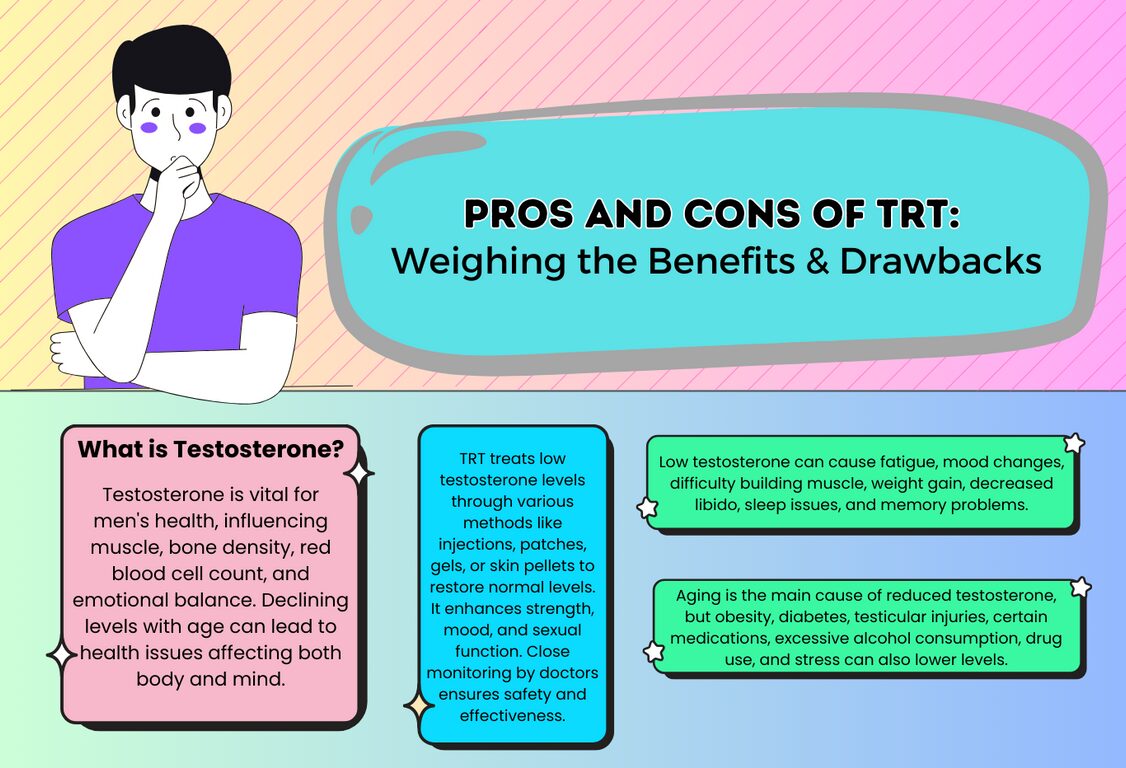
Testosterone Replacement Therapy (TRT) is for men who don’t have enough of a key hormone called testosterone. This hormone is super important. It helps you stay energetic, feel happy, keep muscles strong, and have a healthy sex life. When men don’t have enough testosterone, they might feel very tired, get moody, lose muscle, and not feel like having sex. TRT can help fix these problems by increasing the amount of testosterone in the body. However, it’s also important to know that TRT can have side effects and risks.
This guide will give you a clear picture of TRT, including what it can do for you and what you need to watch out for.
Understanding Testosterone and Its Functions
What is Testosterone?
Testosterone is an important hormone for men, not just for sexual development but for keeping your body strong and healthy. It helps maintain muscle, keep bones dense, make enough red blood cells, and keep you feeling good emotionally and physically. Usually, as men get older, their testosterone levels drop, which can lead to health problems that affect both their bodies and minds.
What is Testosterone Replacement Therapy (TRT)?
TRT is a way to treat low testosterone. It can be done through injections, skin patches, gels, or small pellets that go under your skin. The aim is to get your testosterone levels back to normal. This can boost your health in lots of ways, like making you stronger, lifting your mood, and spicing up your sex life. It’s very important that doctors closely watch over this treatment to make sure it’s safe and working well for you.
Symptoms of Low Testosterone
If you have low testosterone, you might feel really tired all the time, even if you rest a lot. You might also feel down or easily annoyed, find it hard to build muscle or start gaining more fat, and lose interest in sex. Some men also have trouble sleeping or focusing and might forget things more easily. Catching these signs early can help you get the right treatment sooner.
Common Causes of Low Testosterone
Getting older is the most common reason men have less testosterone. But, other things can lower it too. Being very overweight, having diabetes, getting hurt in the testicles, taking certain medicines, drinking a lot of alcohol, using drugs, and being very stressed can all lower testosterone levels.
By understanding these basics, you can better navigate the world of TRT and make informed decisions about your health.
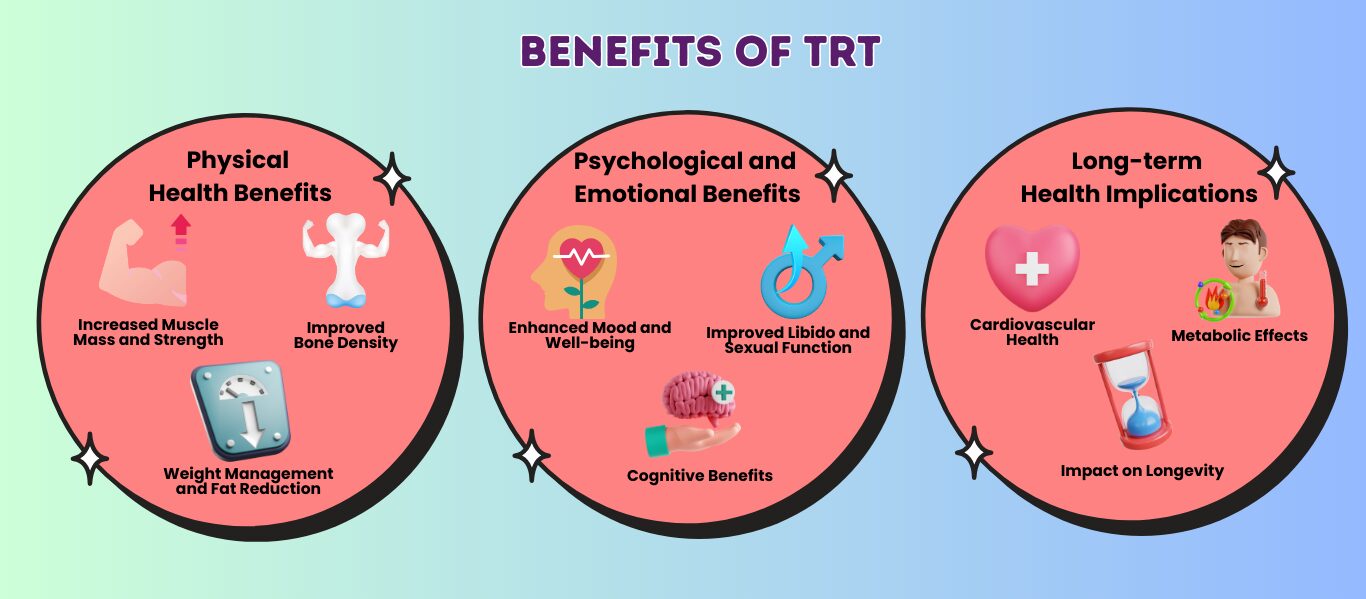
Benefits of TRT
Physical Health Benefits
- Increased Muscle Mass and Strength: TRT makes muscles stronger and bigger. It also improves how you look and helps your overall health a lot. Strong muscles are crucial for supporting bodily functions and maintaining activity levels.
- Improved Bone Density: With TRT, bones get denser and stronger. This reduces the chance of fractures and osteoporosis, which older men are more likely to get. Stronger bones mean a sturdier frame and reduced injury risk.
- Weight Management and Fat Reduction: TRT helps to lose unwanted fat, especially around the belly. This fat can cause different health problems. A better muscle-to-fat ratio enhances metabolic function and promotes healthier body composition.
Psychological and Emotional Benefits
- Enhanced Mood and Well-being: Low testosterone levels can lead to mood swings and irritability. TRT provides relief, making you feel happier and improving your overall well-being, which makes life better.
- Improved Libido and Sexual Function: A big advantage of TRT is that it brings back sexual desire. It also improves sexual performance issues. These changes can significantly benefit intimate relationships.
- Cognitive Benefits: After beginning TRT, many men experience improved clarity of thought. They also report better memory and enhanced focus. These cognitive improvements are helpful in many parts of life, like work and personal activities.
Long-term Health Implications
- Cardiovascular Health: TRT can be good for your heart. It can improve your cholesterol and lower your blood pressure. However, the benefits can differ. It’s important to have a personalized medical evaluation. This helps determine if TRT is right for you based on your individual health conditions.
- Metabolic Effects: TRT might improve insulin sensitivity. This can help manage metabolic syndrome and type 2 diabetes. Improved metabolic function is crucial for overall health maintenance.
- Impact on Longevity: Research continues on TRT’s role in promoting a longer, healthier life. Balanced testosterone levels through TRT could lead to improved health in later years, allowing for a more active lifestyle.
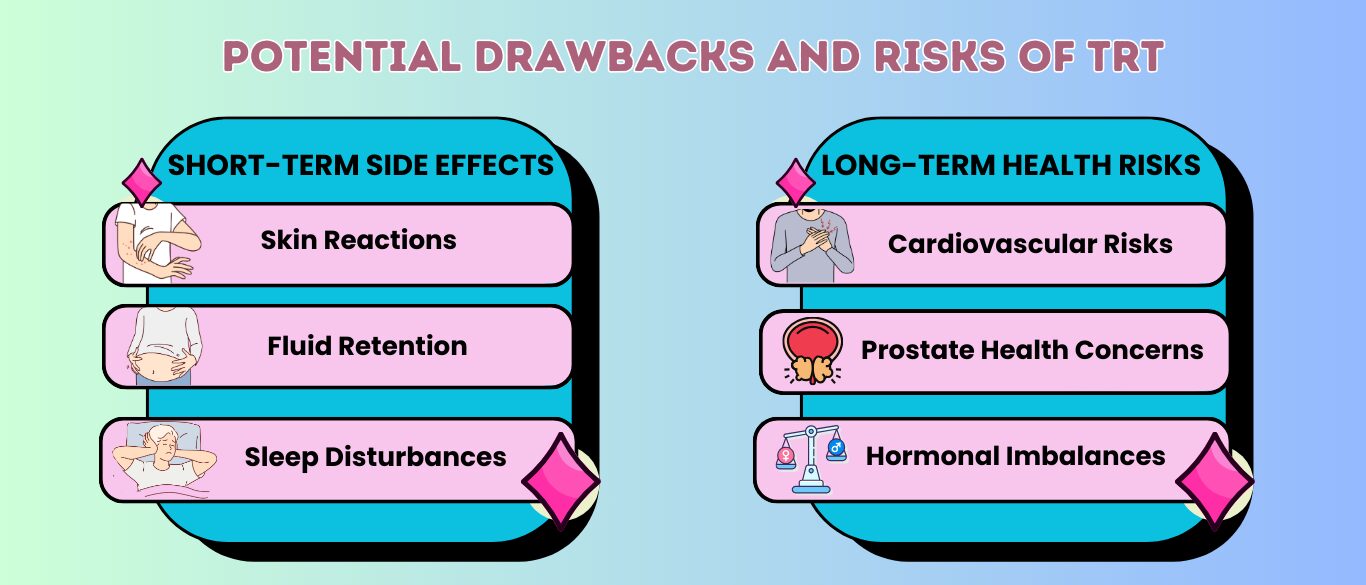
Potential Drawbacks and Risks of TRT
Short-term Side Effects
- Skin Reactions: Men using topical testosterone treatments might have skin irritation. They could also get allergic reactions at the application sites that might include redness, itching, or a rash.
- Fluid Retention: In the early stages of TRT, the body might retain more fluid than usual. It can cause swelling in different parts of the body or rapid weight gain. Monitoring and adjusting treatment can help manage this side effect.
- Sleep Disturbances: TRT might make sleep apnea worse in some men. It could also cause new sleep problems. This can affect overall sleep quality and energy levels.
Long-term Health Risks
- Cardiovascular Risks: There is an ongoing debate about TRT’s effect on heart health. Some studies suggest it might increase the risk of heart-related events in men with pre-existing heart conditions.
- Prostate Health Concerns: TRT has been questioned for its potential to promote prostate cancer growth in men with existing prostate health issues. Regular screenings and careful monitoring are essential.
- Hormonal Imbalances: Improper TRT management can result in excessive testosterone levels. This surplus testosterone may convert to estrogen, leading to new hormonal imbalances. It can affect mood, physical health, and increase the risk of certain conditions like blood clots.
How to Ensure TRT Pros Outweigh the Cons
To get the most benefit from TRT while reducing any risks, here are some steps to follow:
1. Consult with a specialized TRT clinic
Choose a clinic that specializes in hormone therapy. These clinics have experienced professionals who understand TRT well. They can guide you through the therapy, making sure it fits your specific health needs. This approach ensures you receive personalized and expert care.
2. Get a personalized TRT regime
Your treatment plan should be customized for you. Medical professionals will evaluate your health, symptoms, and testosterone levels before starting treatment. This helps in creating a plan that’s effective and safe for you. A tailored plan increases the chances of treatment success.
3. Choose a TRT program with regular monitoring
Regular monitoring is important. Your medical professional should frequently check how your body is responding to TRT. This includes testing your testosterone levels and watching for any side effects. If there are any issues, they can adjust your treatment accordingly. Regular check-ups help in managing the therapy better.
4. Integrating lifestyle changes into your TRT plan
Adopting a healthy lifestyle boosts TRT’s effectiveness. This means eating well, exercising regularly, and managing stress. A healthy lifestyle supports the therapy and improves your overall health. It’s an important part of making TRT work well for you.
5. Define long-term goals of TRT with your provider
Work with your healthcare provider to set clear goals for your TRT. These should be realistic and focused on long-term health and well-being. Setting goals helps in tracking progress and ensures that the therapy aligns with your health objectives. It’s about improving your quality of life over time.
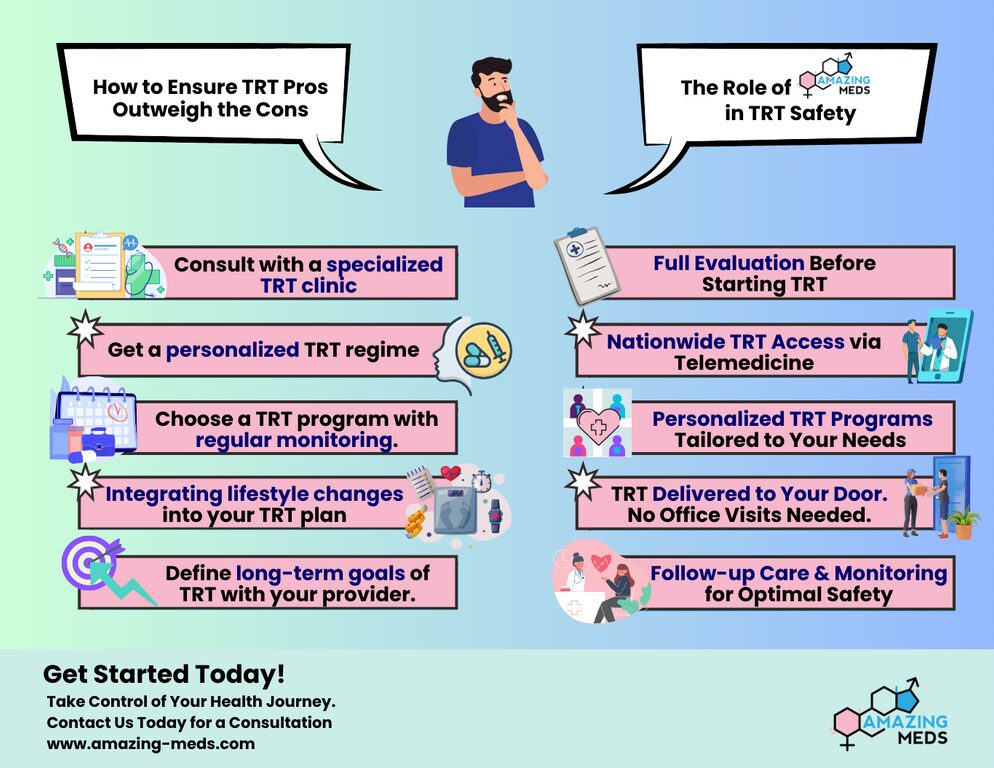
The Role of Amazing Meds in TRT Safety
At Amazing Meds, we’re dedicated to ensuring that TRT is not only effective but also safe and personalized for each of our patients. Here’s how we do it:
1. Full Evaluation Prior to Starting TRT
Before you begin TRT, we conduct a thorough health evaluation. This includes reviewing your medical history, assessing your current health, and testing your hormone levels. Our goal is to understand your unique situation and determine if TRT is the best option for you.
2. Nationwide TRT Access via Telemedicine
We provide TRT access to anyone in the nation through telemedicine. This means you can have consultations, follow-up appointments, and get all your questions answered by our specialists, all from the comfort of your home. It’s convenient and ensures you get the care you need, no matter where you’re located.
3. Personalized TRT Programs Tailored to Your Needs
We understand that everyone’s health needs are different. That’s why we create personalized TRT programs tailored to each individual. We consider your specific health requirements and goals to develop a treatment plan that’s just right for you.
4. TRT Delivered to Your Door. No Office Visits Needed.
To make your TRT journey as convenient as possible, we deliver your treatment directly to your door. This means you don’t need to visit a doctor’s office to start or continue your TRT. Everything you need comes to you, saving you time and hassle.
5. Follow-up Care & Monitoring for Optimal Safety
We believe in the importance of ongoing care and monitoring to ensure the effectiveness and safety of TRT. We regularly check in on your progress, monitor your hormone levels, and adjust your treatment as necessary. This continuous oversight helps us maintain the highest safety standards and achieve the best outcomes for you.
6. Contact Amazing Meds to Get Started
Ready to begin your TRT journey with us? Contact Amazing Meds to get started. We’re here to guide you every step of the way, from your initial consultation through to your personalized treatment plan and beyond. Let us help you regain your vitality and improve your quality of life.
At Amazing Meds, your health and safety are our top priorities. We’re committed to providing you with the highest quality care, tailored specifically to your needs.
Frequently Asked Questions
What is Testosterone Replacement Therapy (TRT) and who needs it?
TRT is a treatment designed to raise testosterone levels in men who have low testosterone, a condition known as hypogonadism. It’s meant for men who experience symptoms due to their low testosterone levels. The reason men take testosterone is because symptoms can impact their quality of life, including their physical health, mood, and sexual function.
How do I know if my testosterone levels are low and need TRT?
If you’re feeling constantly tired, have lost interest in sex, find it hard to maintain muscle, or feel more irritable or depressed, these could be signs of low testosterone. The best way to know for sure is to see a medical professional. They can do a simple blood test to check your testosterone levels.
What are the most common signs and symptoms of low testosterone?
The most common signs include a decrease in libido (sex drive), difficulties with erections, fatigue, losing muscle mass, gaining body fat, mood changes, and trouble concentrating. Some men also experience a decrease in bone density and changes in cholesterol levels.
Are there specific age groups that benefit more from TRT?
While TRT can benefit men of various ages who have low testosterone, it’s often older men who see the most improvement. Testosterone naturally decreases with age, so men over 40 might notice more significant changes from TRT. However, if younger men have clinically low testosterone levels, they can also benefit from TRT.
How is TRT administered and what are the different forms available?
TRT can be administered in several ways, including injections, patches, gels, and oral medications. The choice depends on personal preference, lifestyle, and medical advice. Each method has its pros and cons, such as convenience, how often it needs to be used, and potential side effects.
How long does it take to see results from TRT?
The time it takes TRT to work as expected can vary. Some men notice improvements in mood and energy levels within a few weeks. However, changes like increased muscle mass and improvements in sexual function may take a few months. It’s important to have realistic expectations and work closely with your healthcare provider.
Is it safe to undergo TRT for a long period?
When monitored by a healthcare professional, TRT can be safe for long-term use. Regular check-ups are important to monitor testosterone levels and adjust treatment as needed. There are potential risks, so ongoing evaluation is crucial to ensure the benefits continue to outweigh any risks.
Can I stop TRT once I start, or is it a lifelong treatment?
Whether TRT is lifelong depends on the underlying reason for low testosterone. Some men may need to continue TRT indefinitely to maintain normal testosterone levels and alleviate symptoms. However, others might be able to stop TRT if their circumstances change, such as improvements in health conditions that were affecting their testosterone levels. It’s essential to make any changes to TRT under the guidance of a healthcare professional.
TRT Pros and Cons: A Visual Summary
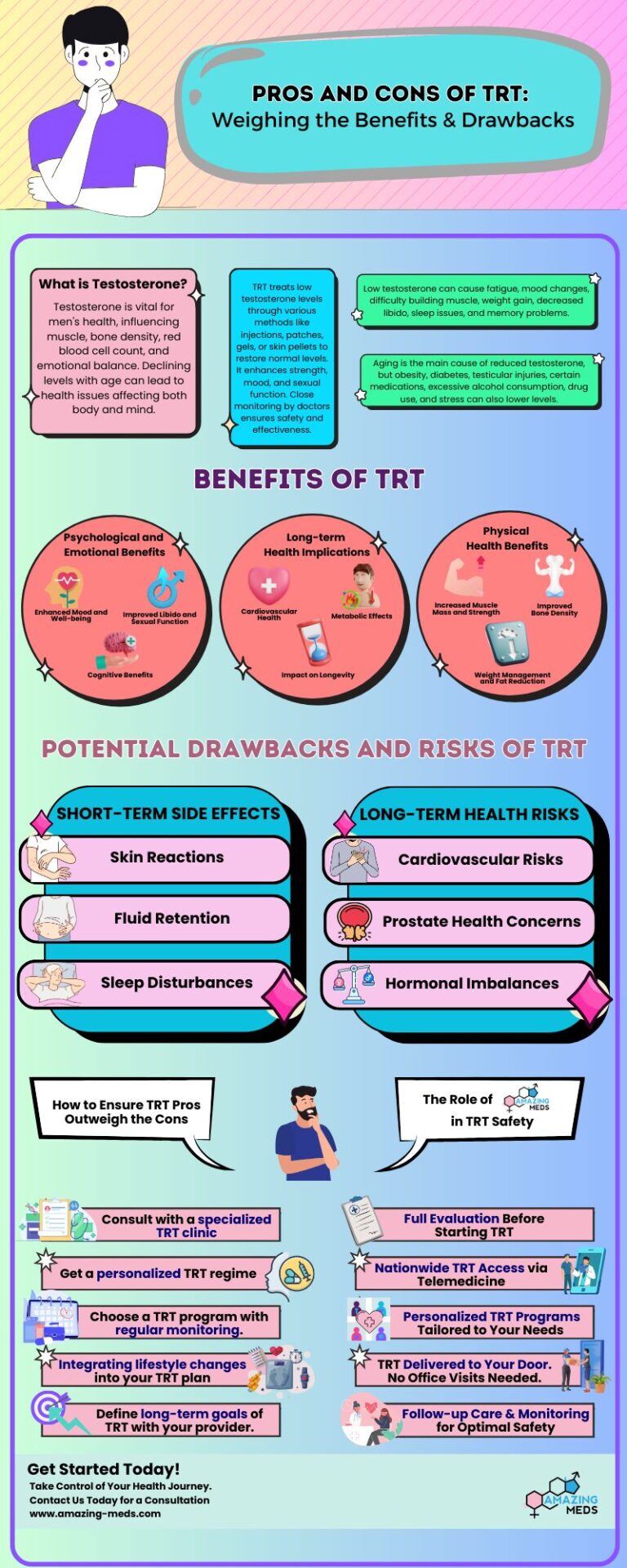
Resources
- Park HJ, Ahn ST, Moon DG. Evolution of Guidelines for Testosterone Replacement Therapy. J Clin Med. 2019 Mar 25;8(3):410. doi: 10.3390/jcm8030410. PMID: 30934591; PMCID: PMC6462962.
- Shoskes JJ, Wilson MK, Spinner ML. Pharmacology of testosterone replacement therapy preparations. Transl Androl Urol. 2016 Dec;5(6):834-843. doi: 10.21037/tau.2016.07.10. PMID: 28078214; PMCID: PMC5182226.
- Bassil N, Alkaade S, Morley JE. The benefits and risks of testosterone replacement therapy: a review. Ther Clin Risk Manag. 2009 Jun;5(3):427-48. doi: 10.2147/tcrm.s3025. Epub 2009 Jun 22. PMID: 19707253; PMCID: PMC2701485.
- Osterberg EC, Bernie AM, Ramasamy R. Risks of testosterone replacement therapy in men. Indian J Urol. 2014 Jan;30(1):2-7. doi: 10.4103/0970-1591.124197. PMID: 24497673; PMCID: PMC3897047.
- Sharma R, Biedenharn KR, Fedor JM, Agarwal A. Lifestyle factors and reproductive health: taking control of your fertility. Reprod Biol Endocrinol. 2013 Jul 16;11:66. doi: 10.1186/1477-7827-11-66. PMID: 23870423; PMCID: PMC3717046.
